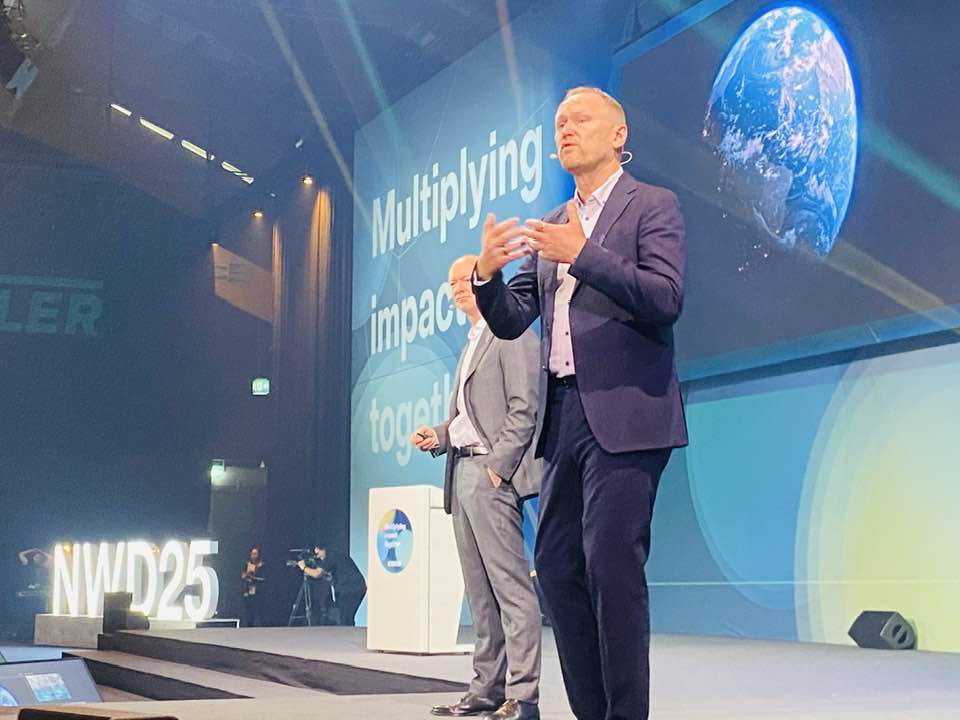Staged just once every three years, Bühler’s Networking Days at the Swiss firm’s headquarters in Uzwil, Switzerland, have proved a highly influential addition to the events calendar since first being unveiled in what now seem distant pre-pandemic times in 2016.
As the company’s CEO Stefan Scheiber noted in a media briefing earlier this week, the event has certainly grown significantly from several hundred, to well over 1,000 people from right across the food and drink sector within its supply chains.
Crucially, rather than being a pure social gathering for its global workforce and customers, there are some really tangible stories and messages that the company has crafted that have leant the event, which concluded today (Wednesday) genuine credibility in underlining the company’s core mission to lead on delivering greater sustainability for the industry at large.
From a personal perspective, I attended the 2019 event at which its CEO, alongside chief technology officer Ian Roberts set out a bold vision of delivering major reductions in energy, waste and water consumption across its business activities. These goals, which were set initially at 35% by 2025, were later ramped-up to 50% across its customers’ value chains.
As the business freely-conceded, while it did not fully realise those precise targets, genuine progress has been made, with 11-15 of its categories showing 50% reductions in at least one of the target areas for improvement. This in itself represented an encouraging sign from all those companies present that wanted to do the right thing in assisting in whatever way they can in helping notably bring down industrial emissions that are contributing towards accelerated levels of climate change.
This was among the core themes of the week, highlighting that the net zero targets of 2050 are already significantly under pressure, but the sector, alongside governments and other industries, work collectively harder than ever, to literally stem the tide of major climate impact that is threatening vital agricultural supply chains for the entire food and drink sector, and many others besides.
This was starkly put into perspective by Johan Rockstrom, director of the Potsdam Institute for climate impact research who delivered a key presentation revealing data that proves that the rate of global warming has significantly shifted in a negative direction in the past decade, meaning that only through major collaborative efforts can our planet’s health be truly maintained.
An interesting opening address from Nestle’s CEO Laurent Freixe saw him paint a clear picture of the need to listen and engage with scientific communities, governments and companies across industry to positively address climate issues, and as well as providing sufficient nutrition to the world’s ever-spiralling population that will be close-on 10 billion people within the next two decades.
Similarly, was also a major contribution from Thomas Zurbuchen, known as Dr Z, the former NASA head of Science, who attempted to strike a balance between warning that our climate challenges need to be solved urgently, and also offering hope that recently released technologies such as deployment of drones to monitor forest health can play a major part.
Significantly, being responsible for oversight of missions to Mars, he was also asked whether he could imagine humans genuinely living on its surface. His response was quite determinedly – “Yes, people will live there, but far more will be back here on earth, so it’s going to be a lot easier to fix the problems we have here than up there.”

Placing such weighty topics on the agenda, mixed in with examining issues of delivering nutritional value to consumers, how AI can influence the workplace, and the need to support the next generation of start-ups/scale-up businesses and workers right across the industrial and agricultural chain, made for an extremely thought-provoking occasion.
With the likes of food group majors Cargill and Mars participating in a speaking capacity alongside independent and emerging businesses, there was certainly no shortage of inspiring debate.
It’s a global gathering that will certainly live long in the memory for its eclectic and engaging programme that attracted a diverse international audience. The stark core message centred on an science-supported assertion that we haven’t the time some of us believed we have to resolve the pressing challenges of our times, so the sooner we work together to maximum effect, the better.
For the future of the planet, here’s hoping that it’s a call that is acted upon swiftly.
Neill Barston, editor, Confectionery Production magazine
keep in touch at [email protected] or via social media @confectionprod and our Linkedin pages
Related content
